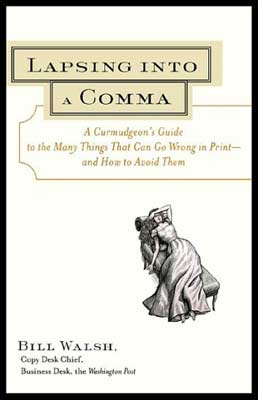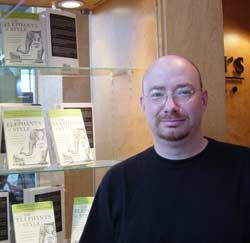Bill Walsh
A blogger since 1995 and an author of books about English since 2000, Bill Walsh of The Washington Post about himself, being a copy editor, his books and a few aspects of English usage.
He kindly agreed to speak to whichenglish.com in an exclusive interview.
Q&A
What inspired you to become a copy editor?

When I decided to major in journalism -- after I learned that my first choice, psychology, required the study of statistics -- I had no idea copy editors existed. There were no copy editors on TV when I watched "Lou Grant," after all. Even after I got my first job as a copy editor, at the University of Arizona's student paper, I figured that was a crutch for college writers. "Real" reporters wouldn't need that kind of help, would they? I eventually learned otherwise, and about nine months into my reporting career at the Phoenix Gazette, I was drafted to fill a sudden vacancy on the copy-editing side.
I've been a copy editor and/or page designer ever since. So I sort of fell into the role, and as I look back I find it a little frightening how little agonizing I did over a major change in the direction of my career. Maybe it was just meant to be.
How did your first book, Lapsing into a Comma, come about?
It's a bit of a long story. I met Jacqueline Dupree, who would become my wife, talking about tennis on the Prodigy online service in 1993, before anyone had ever heard of the Internet.

We dabbled with CompuServe and America Online and some other services, and when household Internet access became a reality, we were at the head of the line. I'm pretty good at learning that sort of thing, but she's the real techie, and she set out to create a Web site immediately. She built one about the men's tennis tour, which would have been my choice, and so when I tagged along and learned to write HTML by stealing her code, I had to pick another topic.
So I created the Crusty Old Slot Man's Copy-Editing Peeve Page, and I adapted some of the instructional rants I had written for my staff at the Washington Times, where I was the copy chief then, to fill that page. The address, if I recall correctly, was www.access.digex.net/~bwalsh/editing.html. When it finally dawned on the world that short, snappy addresses might be an advantage, I registered www.theslot.com.
Around that time, I expanded the site and tried to make it less peeve-oriented and more constructive, more of a service to other editors. The idea of turning my rants into a stylebook of sorts had been in the back of my head ever since I toyed with the idea of doing it as an independent-study project in college, and once the Web site had critical mass I wrote a proposal and found an agent. And then I got lucky.
Are copy editors a dying breed or anachronism in the internet age?
"Dying breed" could be applied to a lot of things in the newspaper world. The demand for speed has meant that a lot of writing is presented for public consumption without the kind of scrutiny it used to get, and sometimes with no scrutiny from a copy editor at all. And financial hardships have meant that journalism outlets are making do with fewer copy editors, or getting rid of experienced copy editors and hiring inexperienced ones who will work for less money, and so the editing is done more hurriedly and by people who simply aren't as good at it.
How – if at all – is British English felt in the US? (In your view)

I was a normal person once, and to a normal American person British English is fun, a diversion, a bit of variety. In second grade I would spell "gray" with an e just because I could. As a copy editor, however, I've seen too many originating editors close their eyes and send along Reuters dispatches about lorries and plimsolls and council flats, and so I have a reflexive disgust that I'm not really happy about. There's nothing wrong with British English in Britain, but Americans who don't know it when they see it are idiots.
What are some of your current peeves when it comes to English usage?
I still can't get past the hyphen-free "email." I just don't understand where that came from, let alone how any publication ever decided it qualified as standard English. If X-ray never became xray, how did this one break the mold?
And, speaking of hyphens, compound modifiers will always be a big thing for me. I don't care whether it is or isn't ambiguous to write "orange juice factory" -- the fact is that you're writing about a juice factory that's painted the color orange. If you mean a factory that produces orange juice, you need to write "orange-juice factory." The two aren't even pronounced the same.
If you're reading along and you see no hyphen, you think "orange JUICE factory." If you do see the hyphen, you think "ORANGE-juice factory."
Will "media" and "data" ever be accepted as singular forms?
To realize that "media" an "data" are collective nouns, you need look no further than the fact that no normal person has ever used "datum" and the fact that the singular of the so-called plural "media" is most definitely not "medium." Television and radio and print and the Internet are media, plural, but Dana Priest and Brian Williams and Major Garrett are members of the media, collective singular. They're not clairvoyant.
Why do you label '10 items or fewer' as "misguided"?
"Ten or less items" would be cause for purist alarm, though you'll find plenty of smart people who can tell you that Hemingway and Chaucer and Jesus of Nazareth were all perfectly fine with using "less" with countable items.
But "10 items or less" does not necessarily imply "less items." It means 10 items or less than that total, less than that number, less than that. Settle down and pay for your crap, people. And don't make me wait while you use a check. This isn't 1976.
Are you currently working on a third book?

I have a few third books in me, but I haven't yet mustered the energy to give birth to one.
I was a teenage 88-pound suburban white kid so obsessed with Muhammad Ali and boxing in general that I actually stepped into the ring. There's a book. I just went from much more than 88 pounds to 45-pounds-and-counting less than that, and I think I have some useful tips for the zillions of people who would love to slim down by the mass of a kindergartner or so. There's a book.
Yeah, I have more to say about usage, and I have rebuttals for the way-smarter-than-me linguist types who have sophisticated excuses for all the mistakes that people make, but I'm not feeling critical mass yet for the book that I could actually sell. But I probably will, once I lose those last 10 to 15 pounds and polish that boxing memoir.
Bill Walsh links: The Slot: A Spot for Copyeditors, www.lapsingintoacomma.com, Bill Walsh blogspot.
Interview by Jesse karjalainen. Copyright 2011 whichenglish.com.
(All images courtesy Bill Walsh.)
Tumblr
Join on FB
YouTUBE
Watch on YouTUBE

